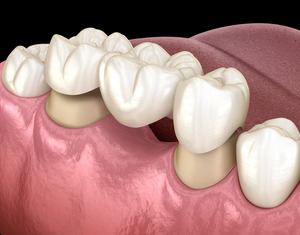
Dental bridges are essential in restorative dentistry, offering patients an effective solution to replace missing teeth. However, while these bridges can restore function and aesthetics, they are not invincible. Understanding the potential causes of dental bridge failure is crucial for maintaining your oral health and ensuring the longevity of your dental work.
Types of Dental Bridges
Before diving into the reasons for dental bridge failure, it’s important to know that there are different types of dental bridges available. The most common types include traditional, cantilever, and Maryland bridges, each with its unique design and applications. The choice of bridge depends on the patient’s specific needs and the dentist’s recommendation.
Common Causes of Dental Bridge Failure
1. Dental Decay:
Dental bridges rely on the support of adjacent teeth, known as abutment teeth. Unfortunately, these teeth are susceptible to decay. Over time, decay can develop beneath the bridge, compromising the stability of the supporting teeth. Maintaining good oral hygiene through regular brushing, flossing, and dental check-ups is crucial to prevent this issue.
2. Gum Disease (Periodontal Disease):
Gum disease can wreak havoc on the supporting structures of dental bridges. As it progresses, gum disease can lead to gum recession, bone loss, and potential bridge failure. Routine dental check-ups and cleanings are vital to detect and treat gum disease early.
3. Poor Bridge Fit:
Precision is paramount when fitting a dental bridge. An ill-fitting bridge can result in discomfort and instability. Dentists must take accurate measurements and ensure the proper fit during the placement process to prevent complications.
4. Wear and Tear:
Dental bridges, like natural teeth, can experience wear and tear over time. Chewing hard foods, teeth grinding (bruxism), and other habits can accelerate this process. Patients should be cautious and follow dietary recommendations to protect their bridges.
5. Trauma or Accidents:
Accidents or trauma to the mouth can damage dental bridges. Wearing a mouthguard during physical activities or contact sports can help prevent such incidents.
Signs of Dental Bridge Failure
If you have a dental bridge, it’s crucial to be aware of potential signs of failure. These may include pain, discomfort, sensitivity, or mobility of the bridge. If you notice any of these symptoms, seeking prompt dental care is essential to prevent further complications.
Preventive Measures
To safeguard your dental bridge and overall oral health, follow these preventive measures:
1. Maintain good oral hygiene practices.
2. Visit your dentist for regular check-ups and cleanings.
3. Avoid harmful habits like smoking and teeth grinding.
4. Wear a mouthguard when necessary to protect your dental work.
Treatment Options for Failed Bridges
In case a dental bridge does fail, your dentist will recommend suitable treatment options, which may include bridge repair or replacement. Consulting with a dental professional is crucial to determine the best course of action.
Understanding the potential causes of dental bridge failure and taking preventive measures can help you enjoy the benefits of a functional and aesthetically pleasing smile for years to come. Prioritize your oral health, seek professional dental care, and maintain good hygiene practices to ensure the success of your dental bridge.
About Our Practice
At Distinctive Dentistry, Dr. Mullens, Dr. Nguyen, and our skilled dental team have served Jacksonville families for decades, forging strong patient relationships and providing personalized, attentive dentistry. With extensive experience and commitment to ongoing education, Dr. Mullens and Dr. Nguyen are a dynamic duo known for their comprehensive, detail-oriented care. Their partnership was a natural fit, as Dr. Nguyen’s background in sculpture and keen eye for detail perfectly complement Dr. Mullens’ expertise. Together, they deliver top-tier dental services for patients of all ages.
If you have any questions about a dental bridge, we can be reached at our website or by phone at (904) 399-3163.
